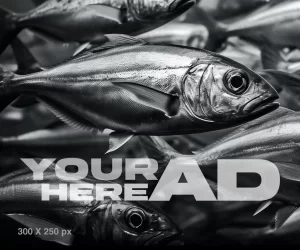The turquoise waters of Türkiye’s Mediterranean, Aegean, and Black Sea coasts teem with an extraordinary diversity of marine life. From the swift and powerful Atlantic bluefin tuna to the colorful Mediterranean rainbow wrasse, saltwater fish species thrive in these rich and dynamic ecosystems. Whether darting through seagrass meadows, lurking in rocky reefs, or patrolling open waters, these fish play vital roles in maintaining the health and balance of Türkiye’s seas.


Saltwater fish species are aquatic vertebrates that inhabit marine environments, including oceans, seas, and coral reefs. These fish are adapted to thrive in saline conditions, with specialized mechanisms to regulate salt balance in their bodies. Saltwater fish play vital roles in marine ecosystems, supporting biodiversity, fisheries, and coastal economies.
Predation and Prey Balance: Species like groupers and sea bass help control populations of smaller fish and invertebrates, maintaining ecosystem stability.
Coral Reef Health: Herbivorous fish (e.g., parrotfish) prevent algal overgrowth on reefs, ensuring habitat health for other marine life.
Nutrient Cycling: Fish waste and carcasses contribute to nutrient flow, supporting plankton and benthic organisms.
Competition for Resources: Invasive lionfish (found in the Mediterranean) outcompete native fish for food and space.
Habitat Disruption: Non-native species may damage seagrass beds or coral reefs, altering ecosystems.
Disease Spread: Introduced species can bring pathogens harmful to native marine life.
Türkiye regulates saltwater fishing to protect marine biodiversity and sustainable fisheries. Key reasons include:
Overfishing Threats: Species like the Mediterranean bluefin tuna face strict quotas to prevent collapse.
Endangered Species Protection: As an example, the dusky grouper (Epinephelus marginatus) is protected under Turkish law due to declining populations.
Invasive Species Control: Invasive species can lead to significant ecological changes, including declines in native fish populations. For instance, Lionfish, though not native to the Mediterranean, are monitored to limit ecological harm.
International Agreements: Türkiye adheres to GFCM (General Fisheries Commission for the Mediterranean) regulations to manage shared fish stocks.
Climate change is reshaping Türkiye’s marine ecosystems through rising sea temperatures, acidification, and altered currents. Key impacts include:
Range Shifts: Cold-water fish (e.g., Atlantic mackerel) move northward, while warm-water species (e.g., barracuda) expand into Turkish coasts.
Species Displacement: Rising temperatures and changing hydrological regimes can lead to shifts in species distribution. Some species may benefit from warmer conditions if other stressors remain constant, while others face extinction due to habitat loss.
Lessepsian Migration Expansion: Warming waters accelerate the influx of invasive species from the Red Sea via the Suez Canal (known as the Lessepsian migration). For instance, Lionfish (Pterois miles) outcompete native fish for prey. Rabbitfish (Siganus luridus) overgraze seagrass beds, harming habitats. These species disrupt food webs and threaten endemic biodiversity.
Ocean Acidification: Reduced pH weakens shellfish and plankton, impacting prey for larger fish like bonito and sea bass.
Extreme Weather & Habitat Loss: Storms and warming degrade seagrass meadows (critical nurseries for many species). Rising temperatures stress endemic species like the Mediterranean moray (Muraena helena).